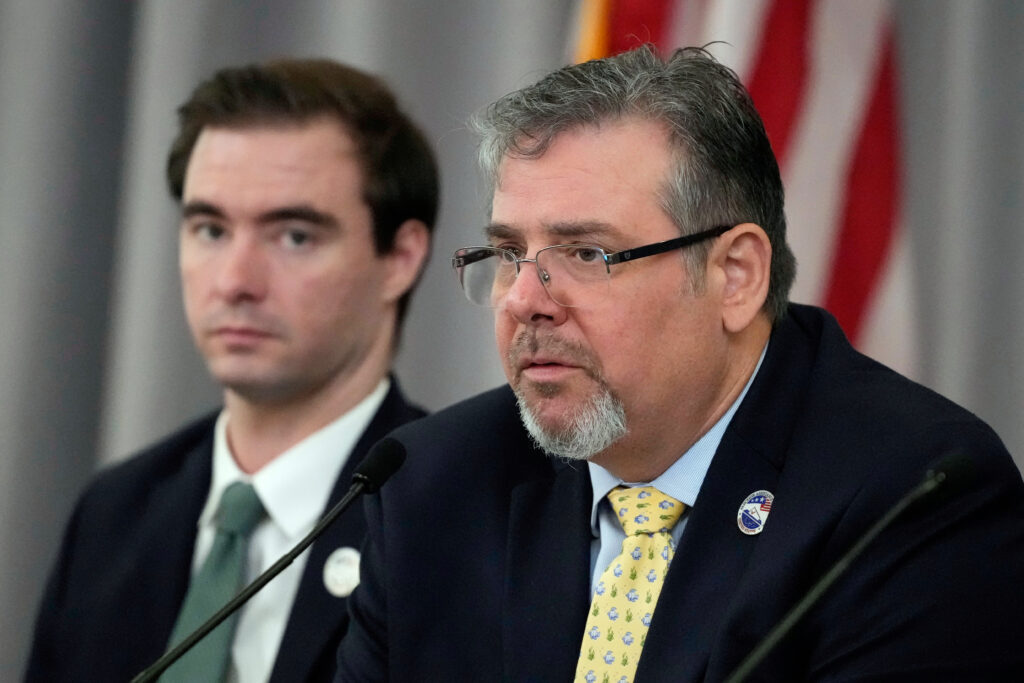Federal election panel chair opposes counting ballots that arrive after Election Day

Amid the Republican Party’s broad effort to hamstring voting by mail, the chair of an independent federal election commission said he believes states should no longer accept and count ballots after Election Day — a change that would lead to numerous ballots being rejected in multiple states.
“There should be a deadline for absentee or mail ballots prior to Election Day and then they should be returned by Election Day,” Donald Palmer, the chair of the U.S. Election Assistance Commission (EAC), said in a House hearing Tuesday on California’s ballot counting process.
Palmer’s comments come after President Donald Trump has repeatedly called on states to no longer accept and count ballots that arrive after Election Day, and signed an executive order last month directing the EAC to withhold federal funding from states that continue to do so.
Mississippi is currently set to ask the Supreme Court to weigh in on whether states accepting late-arriving ballots are unconstitutional. If the court takes the case, which was brought by the Republican National Committee, its decision could have far-reaching implications for mail voting.
In his written testimony to the Committee on House Administration, Palmer specified that the statements were his personal opinion.
“Unless otherwise noted, I am solely responsible for this testimony, and my views may not necessarily reflect the positions of the agency or those of my fellow EAC Commissioners,” Palmer said.
Accepting and counting mailed ballots if they are received after Election Day so long as they were postmarked on or before Election Day is a common practice. Currently, 17 states and D.C. allow it in order to make voting by mail more accessible while accounting for delivery delays, though it may mean that states will take longer to report their official election results.
“Under California election law, ballots may be received up to seven days after the election. In contrast, 33 states require that mail ballots be received by Election Day,” Palmer said. “When provided the opportunity to drop a mail ballot off on Election Day, voters inevitably do so, thus pushing the necessary canvassing and verification of mail ballots deeper into the precertification period.”
Trump nominated Palmer to the EAC in 2019 and he became chairman in February. He is one of two Republican members of the four-member commission.
In 2023, Palmer was criticized for attending and speaking at a private meeting organized by conservative groups, including the Heritage Foundation, seeking to impose new voting restrictions around the country. Palmer defended his appearance, saying he was using it as an opportunity to engage with Republican secretaries of state who also attended.
Congress designed the EAC to operate as an “independent entity” with partisan balance to ensure its decisions are fair and unbiased. Lawmakers also designed the commission so that the president would have very little legal authority over it. However, the EAC has taken actions in recent weeks that have brought its independence into question.
In his executive order on elections, Trump also directed the EAC to add a proof of citizenship requirement to a federal registration form. Several voting rights organizations, including the Brennan Center for Justice and the ACLU, urged the EAC to not comply, arguing that the president has no authority under the Constitution, or the federal law establishing the EAC, to direct its commissioners to act.
However, appearing to move ahead with the proof of citizenship requirement, the commission sent state election officials a letter asking them how they would apply the requirement. In the letter, the commission framed Trump’s order as providing “instruction to the EAC.”
Last week, a federal judge barred EAC commissioners from implementing the citizenship requirement, saying that plaintiffs in a lawsuit against Trump’s order are likely to succeed in their claim that the requirement is unconstitutional.
And a new EAC rule, first reported Tuesday by the Washington Post, requires that state election officials pledge to drop any Diversity, Equity, and Inclusion policies as a condition of receiving federal election-security funding.